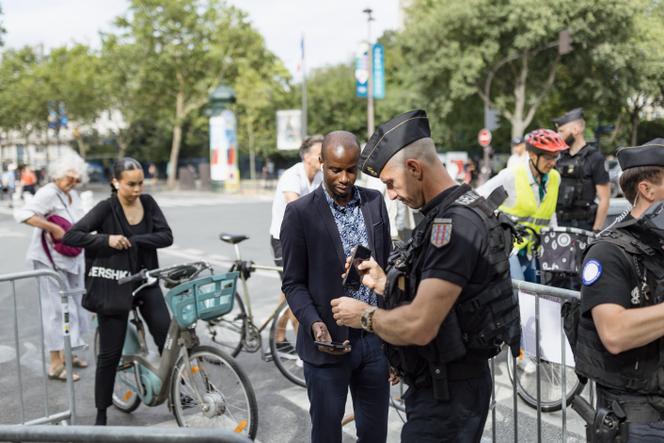


Thousands of barriers have transformed Paris' central Ile de la Cité island into a huge cage, located within the "grey" security perimeter to allow workers to prepare for the opening ceremony of the Paris Olympics. This will be held on Friday, July 26, and access to it has been, since July 18, restricted to holders of a key item: the Pass Jeux ("Games Pass")and its QR code. This perimeter, also known as the "SILT" perimeter, named after the anti-terrorism law that makes such measures possible, is particularly restrictive and stretches almost 6 kilometers along the banks of the Seine. By the time the perimeter came into force, 300,000 passes had been distributed, mainly to local residents and workers who had to apply for them.
On the Petit Pont-Cardinal Lustiger bridge, which links the islet to Paris' southern half, crowd control gendarmes were in charge of scanning them. One of them demonstrated the technical experience he had built up over just a few days: After adjusting the size of the QR code on a phone, he waved his scanner back and forth, all while changing the angle slightly, until he was met with success, in the form of a "beep" and a green screen. "When there's sun, it doesn't work well. When there isn't? Same," said the officer with a shrug.
In addition to scanning these codes, many unlucky – or careless – people without Games Passes have to be turned away: Some tourists, most of them foreigners; but also Parisians, traveling on foot, in cars or on bicycles, many of whom use this major thoroughfare to cross the capital. For the gendarmes, who came to Paris as reinforcements for the Games, the main challenge is to calm tensions, as people sometimes get quite heated, and to suggest alternative routes. It's no easy task for them, as they are usually stationed in the city's suburbs, or even further afield, around rural France.
One of them scolded a cyclist who had just learned that the bridge was only open for traffic going north to south. "All this is really Macron's fault, he doesn't give a damn about us," said the sweaty rider in his 60s, as he turned away.
On either side of the bridge's entrance, the upper quays around the Seine were also restricted to pass-holders. Faced with the growing number of passers-by, some police officers were quick to dispense with scanning the QR codes. "It works in a rather random way, even when the code is printed on paper. But if we can't do it, we can search our database with the holder's name," explained a policeman from the Paris suburbs, while checking an ID card. Beside him, a colleague tried to scan a code but quickly gave up. He simply glanced at the document and let its owner through. Theoretically, orders calling for "kindness" were given for the first few days of the pass's implementation, particularly for people who could justify that they live or work within the grey perimeter. Yet, as the critical day of the opening ceremony draws closer, law enforcement officers assigned to the areas closest to the Seine have, at times, become more fussy than they were the day before.
You have 20.73% of this article left to read. The rest is for subscribers only.
